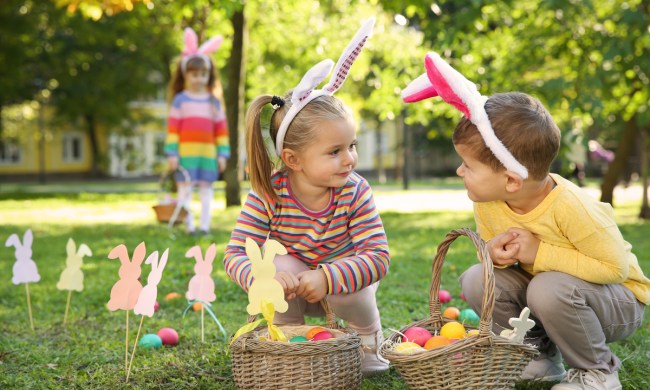Every child is different, but if you have more than two children, you may find yourself wondering if middle child syndrome is really a thing. There are endless reports and studies about birth order and the various characteristics assigned to those based on where they fall in their family’s lineup. While these reports typically characterize the oldest children as responsible leaders and the youngest children as indulged creatives, middle children are often labeled as the forgotten children.
While no parent wants to admit they treat any of their children differently, there does seem to be a lot of evidence to support middle child syndrome. If you have a middle child, you’re one yourself, or you’re wondering if you should have another child, we have information about middle child syndrome that may help shed light on the situation so you can see for yourself if you think it’s true.
Is middle child syndrome really a thing?

- Yes, depending on what studies you find.
- Not exactly, depending on what studies you find.
- Yes, if you ask a middle child.
The answer is yes — and no. According to the American Psychological Association (APA), middle child syndrome is “a hypothetical condition purported to be shared by all middle-born children, based on the assumption that middle children in a family develop personality characteristics that are different from first-born and later-born children.
Current research indicates that a child’s birth order in a particular family may have small, subtle influences on personality and intelligence, but not strong and consistent effects on psychological outcomes.” So basically, middle children are treated differently than their siblings, which results in different behaviors, but there’s no definitive proof to determine birth order is the reason.
Birth order could affect a child’s psychological development
In 1964, a scientific researcher by the name of Alfred Adler theorized birth order has a real effect on siblings. He stated despite being raised in the same house by the same parents, birth order would affect a child’s psychological development. Adler suggested what we mostly recognize as stereotypical birth order traits: the oldest would be most responsible and bossy, the youngest would be spoiled, and the middle child would constantly strive to create their own place in the family while trying to remain the peacekeeper, according to Healthline.
While Adler’s research certainly opened up further studies into the impact birth order may have on a family, WebMD reports that many researchers still disagree with Adler’s theory, and middle child syndrome is not actually a recognized condition. Still, some suggest birth order affects everything from IQ to health. A 2020 survey of university students found that there tends to be a negative preconception around middle and only children, while we tend to think more positively of the oldest and youngest children.
Does gender impact middle child syndrome?

Gender is thought to have some form of impact on how a middle child engages with their family. If the middle child is a different sex than their siblings, they may not have a stereotypical middle child experience that a child of the same sex as their siblings may have. This can also be impacted by different cultural experiences and familial values of the middle child and their family.
Some also feel that the impact of birth order on how outgoing a child is relates more to males than females. However, middle child syndrome isn’t recognized as an official condition, and how it affects children based on their gender is often dependent on the family and their individual dynamics.
The stereotypical characteristics of a middle child

According to PsychCentral, middle children tend to have certain characteristics and share similar qualities that their younger and older counterparts don’t always display.
Middle children tend to show the following traits
- Often self-reliant and independent
- May develop closer bonds with siblings than their parents
- May feel overlooked or neglected by parents or siblings
- May act out for attention
- May not feel as close to their parents
We’ve also seen a lot of negative stereotypes associated with middle children that contribute to preconceived notions of being the middle sibling. Although there have been many studies on birth order characteristics, there are conflicting results based on gender and age gap, and many studies found there’s opposing information.
Stereotypically, the oldest is often seen as the most responsible. Since they were the first child, they were doted on the most and given lots of attention. We often associate the oldest children with being leaders, since they tend to take charge at home of their younger siblings. Youngest children tend to be a bit more coddled, which leads them to have a lack of ambition or they’re incredibly driven because they were always provided with the tools they needed to be successful.
Middle children feel left out — as though they’re not given as much attention as they try to find their niche between their older and younger siblings. Although it’s almost always unintentional, there are things parents should do to help reassure their middle children.
How to handle middle child syndrome

- You don’t have to be more involved with the middle child, just be more present.
- Active listening and engagement are key.
- Allow the middle child to be their own person.
If you’ve noticed your middle child exhibiting behavior typically associated with middle child syndrome, it’s not too late to act. Meri Wallace, a child and family therapist who believes middle child syndrome does exist, explained ways for parents to help their middle child feel as loved and attended to as their older and younger siblings. In a blog post for Psychology Today, she suggested parents spend quality alone time with their middle child to ensure they feel they are getting undivided attention.
She said parents should make an effort to involve the middle child in conversations by specifically asking them questions and actively listening when they respond. Encouraging their individuality, providing emotional support, encouraging them to speak openly about their feelings, and showing unconditional love are ways for parents to show their middle child their feelings are equal to their siblings.
Why middle children need to be shown the love

Even if middle child syndrome isn’t a recognized medical condition, there have been enough studies about it that parents should be aware of it if they have more than two children. The effects of being a middle child will follow them into adulthood, so parents should do all that’s possible to make sure those in between siblings feel the love.
They could grow to be co-dependent
If middle children aren’t shown the same affection as other siblings, they could have trouble with being co-dependent adults. From being the people-pleaser to the peacekeeper, a grown middle child could have an unhealthy view of any kind of relationship.
They could have dimmed personalities
If the youngest is always the baby and the oldest is always the boss, the middle kid might feel like they don’t have a personality style for themselves. They don’t want to be seen as the same as another sibling, but the styles are already taken, so they fade into the background to not be seen as a copycat.
Whether middle child syndrome is an actual condition or simply a commonly held feeling rooted in a lot of shared experiences, if your middle child is feeling left out, it’s something you need to keep in mind as the parent. If you think your middle child is feeling excluded or you’re noticing they aren’t participating as much in the family dynamic, try to implement some of the tactics discussed.
Parents may not realize if they’re giving one child more attention than the other, but depending on the age and needs of each child, it’s something that happens. If there are more than two children in your household, make the effort to ensure middle child syndrome doesn’t cause your in-betweener to feel left out.




